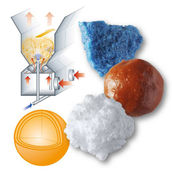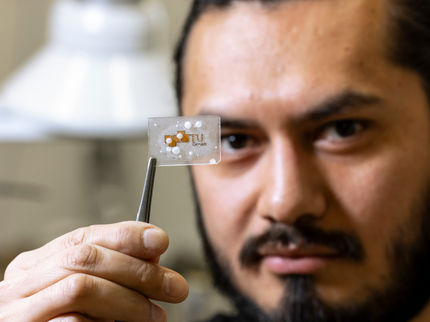Clemson University spin-off uses corn to make plastics
The Pendleton-based Clemson University spin-off company Tetramer Technologies, LLC received a $100,000 Phase I Small Business Innovative Research award (SBIR) from the National Science Foundation to demonstrate the commercial feasibility of plastics partially derived from renewable sources like corn. This award builds on a previously earned Phase II $500,000 and two SBIR $100,000 grants received from the NSF small business program.
Most plastics, varnishes and packaging foams are made from oil-based chemicals, which are derived from petroleum. Stiffer environmental regulations and consumer conscience are driving the search for materials that are recyclable, renewable and less polluting. Polylactic acid is a byproduct of corn. It currently is used in some pill coatings and sutures because it easily dissolves -- a property not desirable in drink containers, boat coatings and packaging.
Clemson University professor Dennis Smith and his research group have found a new way to replace up to 50 percent of the chemicals that make regular plastics with polylactic acid. The end product is a plastic that has both the environmental friendliness of the corn-based product and the durability of regular plastics. Potentially, this new material could reduce by 5 billion pounds per year the amount of single-use, nonbiodegradable plastics discarded by consumers. And reduce the air pollutants from plants that produce plastics for everything from cars to airplanes to golf clubs.
"By finding commercial applications for Clemson research, Tetramer is fueling South Carolina's knowledge-based economy," said Earl H. Wagener, CEO of Tetramer. "We're creating jobs that will help keep the top researchers coming out of the university in the Upstate."
This NSF grant allowed Tetramer to hire three more employees, bringing total employment to eight. The company plans to staff 20 full-time employees over the next five years. In addition to possible jobs for Clemson's engineering graduates, Tetramer will expand to employ technicians trained by local technical institutes.
Wagener, a 1967 Clemson graduate in physical organic chemistry, returned to South Carolina to head the company. Wagener has 36 years of new product commercialization and venture capital experience at Dow Chemical, Stepan Co. and The ChemQuest Group Inc.
Tetramer was formed in February 2001 by professors in Clemson's Center for Optical Materials Science and Engineering Technologies. COMSET is the only university research and development lab in the region focused on the development of new optical materials. Their research attracted more than $13 million in sponsored research during the center's first three years.
Most read news
Topics
Organizations
Other news from the department science
These products might interest you

Dursan by SilcoTek
Innovative coating revolutionizes LC analysis
Stainless steel components with the performance of PEEK - inert, robust and cost-effective

OCA 200 by DataPhysics
Using contact angle meter to comprehensively characterise wetting behaviour, solids, and liquids
With its intuitive software and as a modular system, the OCA 200 answers to all customers’ needs

Tailor-made products for specific applications by IPC Process Center
Granulates and pellets - we develop and manufacture the perfect solution for you
Agglomeration of powders, pelletising of powders and fluids, coating with melts and polymers

Get the chemical industry in your inbox
By submitting this form you agree that LUMITOS AG will send you the newsletter(s) selected above by email. Your data will not be passed on to third parties. Your data will be stored and processed in accordance with our data protection regulations. LUMITOS may contact you by email for the purpose of advertising or market and opinion surveys. You can revoke your consent at any time without giving reasons to LUMITOS AG, Ernst-Augustin-Str. 2, 12489 Berlin, Germany or by e-mail at revoke@lumitos.com with effect for the future. In addition, each email contains a link to unsubscribe from the corresponding newsletter.

























































